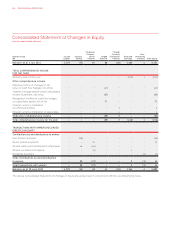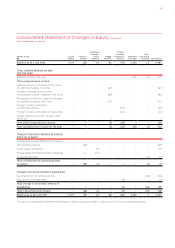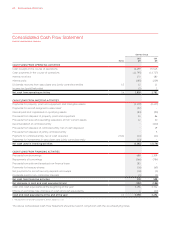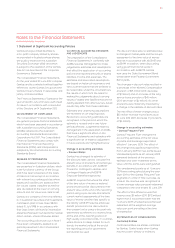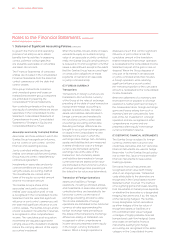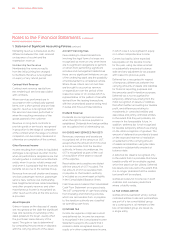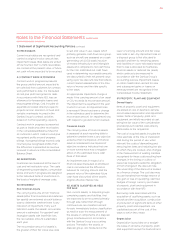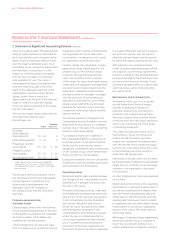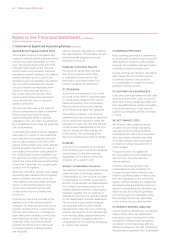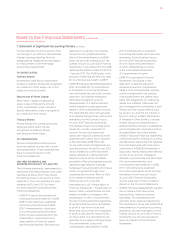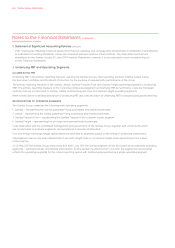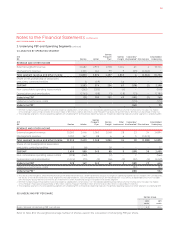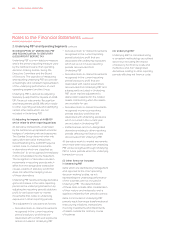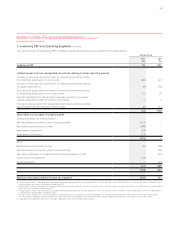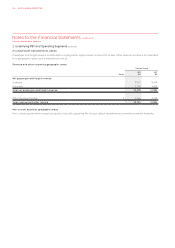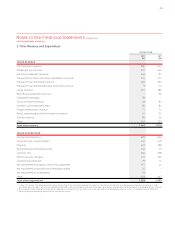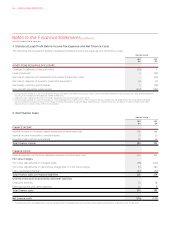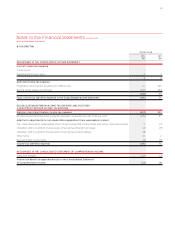Qantas 2012 Annual Report Download - page 79
Download and view the complete annual report
Please find page 79 of the 2012 Qantas annual report below. You can navigate through the pages in the report by either clicking on the pages listed below, or by using the keyword search tool below to find specific information within the annual report.
FOR THE YEAR ENDED 30 JUNE 2012
Notes to the Financial Statements continued
is made during the lease term. This
provision is based on the present value
of the expected future cost of meeting
the maintenance return condition, having
regard to the current fleet plan and long-
term maintenance schedules. The present
value of non-maintenance return conditions
is provided for at the inception of the lease.
Manufacturers’ Credits
The Qantas Group receives credits from
manufacturers in connection with the
acquisition of certain aircraft and
engines. These credits are recorded
as a reduction to the cost of the related
aircraft and engines. Where the aircraft
are held under operating leases, the
credits are deferred and reduced from
the operating lease rentals on a straight-
line basis over the period of the related
lease as deferred credits.
Capital Projects
Capital projects are disclosed within the
categories to which they relate and are
stated at cost. When the asset is ready
for its intended use, it is capitalised and
depreciated.
Q INTANGIBLE ASSETS
Goodwill
All business combinations are accounted
for by applying the acquisition method.
Goodwill represents the difference between
the cost of the acquisition and the fair
value of the net identifiable assets acquired.
Goodwill acquired before transition to IFRS
is carried at deemed cost.
Goodwill is stated at cost less any
accumulated impairment losses.
Goodwill is allocated to CGUs and
is tested annually for impairment.
With respect to associates and jointly
controlled entities, the carrying amount
of goodwill is included in the carrying
amount of the investment in the
associate or the jointly controlled entity.
Negative goodwill arising on an acquisition
is recognised directly in the Consolidated
Income Statement.
Airport Landing Slots
Airport landing slots are stated at cost
less any accumulated impairment losses.
Airport landing slots are allocated to
the relevant CGU and are not amortised
as they are considered to have an
indefinite useful life and are tested
annually for impairment.
Software
Software is stated at cost less accumulated
amortisation and impairment losses.
Software development expenditure,
including the cost of materials, direct
labour and other direct costs, is only
recognised as an asset when the Qantas
Group controls future economic benefits
as a result of the costs incurred and it
is probable that those future economic
benefits will eventuate and the costs
can be measured reliably. Amortisation
is charged to the Consolidated Income
Statement on a straight-line basis over
the estimated useful life of three to
10 years.
Brand Names and Trademarks
Brand names and trademarks are carried
at cost less any accumulated impairment
losses. Brand names and trademarks
are allocated to the relevant CGU and
are not amortised as they are considered
to have an indefinite useful life and are
tested annually for impairment.
Customer Contracts/Relationships
Customer contracts/relationships are
carried at their fair value at the date
of acquisition less accumulated
amortisation and impairment losses.
Amortisation is calculated based
on the estimated timing of benefits
expected to be received from those
assets, which ranges from five to 10 years.
R PAYABLES
Liabilities for trade creditors and other
amounts payable are carried at cost.
S EMPLOYEE BENEFITS
Wages, Salaries, Annual Leave and
Sick Leave
Liabilities for wages, salaries, annual
leave (including leave loading) and
sick leave vesting to employees are
recognised in respect of employees’
services up to the end of the reporting
period. These liabilities are measured at
the amounts expected to be paid when
they are settled and include related
on-costs, such as workers compensation
insurance, superannuation and payroll tax.
Employee Share Plans
The fair value of equity-based entitlements
settled in equity instruments is recognised
as an employee expense with a
corresponding increase in equity. The
fair value is estimated at grant date and
recognised over the period during which
the employees become unconditionally
entitled to the equity instrument. The
amount recognised as an expense is
adjusted to reflect the actual number
of entitlements that vest, except where
forfeiture is only due to share prices
not achieving the threshold for vesting.
The fair value of equity-based entitlements
settled in cash is recognised as an
employee expense and a corresponding
liability is recognised over the period that
the employees unconditionally become
entitled to payment. The liability is
remeasured at each reporting date and
at settlement date. Any changes in the
fair value of the liability are recognised
as an employee expense in the
Consolidated Income Statement.
Long Service Leave
The liability for long service leave is
recognised as a provision for employee
benefits and measured at the present
value of estimated future payments to
be made in respect of services provided
by employees up to the end of the
reporting period. The provision is
calculated using expected future
increases in wage and salary rates
including related on-costs and expected
settlement dates based on staff turnover
history. The provision is discounted using
the State Government Bonds rates which
most closely match the terms to maturity
of the provision. The unwinding of the
discount is treated as a finance charge.
Defined Contribution Superannuation Plans
The Qantas Group contributes to employee
defined contribution superannuation plans.
Contributions to these plans are recognised
as an expense in the Consolidated Income
Statement as incurred.
1. Statement of Significant Accounting Policies continued
077



